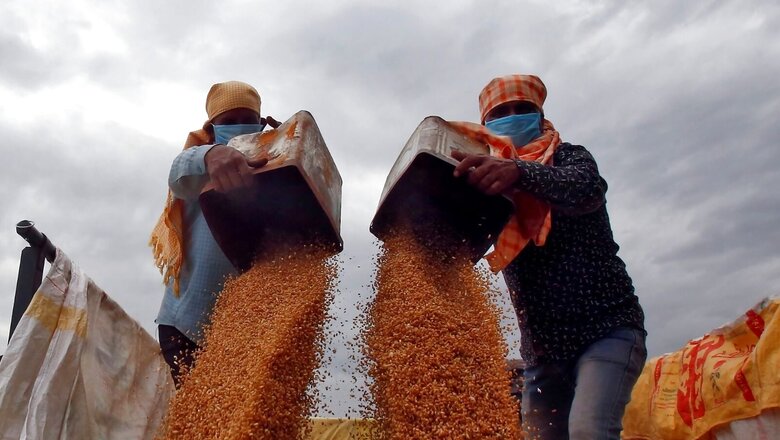
views
Amid requests by state governments and UTs to continue the procurement process, the Centre has asked wheat-producing states and UTs with procurement closing dates expiring early to continue procurement till May 31, 2022. Wheat procurement has been extended till May 31 in six states, including Uttar Pradesh and Madhya Pradesh, where it was to end early this month, the food ministry has said.
Wheat procurement was scheduled to end on May 10 in Rajasthan and on May 15 in Uttar Pradesh, Madhya Pradesh, Bihar, Gujarat and Himachal Pradesh.
“The extended period is expected to benefit farmers… The procurement of wheat under the central pool is progressing smoothly in Rabi Marketing Season 2022-23, in the States/UTs of Madhya Pradesh, Haryana, Punjab, Uttar Pradesh, Uttarakhand, Himachal Pradesh, J&K, Gujarat, Bihar& Rajasthan,” the food ministry has said in a statement.
Wheat procurement in the ongoing 2022-23 marketing year began in April. Maximum wheat is procured in the first few months of the year.
The wheat procurement under the central pool has been less during the ensuing RMS 2022-23 corresponding to the previous RMS 2021-22, mainly due to the higher market prices than MSP, wherein farmers have been selling wheat to private traders. “The Central government had on 13th May decided to restrict export wheat to rein in high prices of wheat, except in case of an irrevocable letter of credit and requests from neighbouring/food-deficit countries.”
The ministry said that till May 14, a quantity of 180 lakh metric tonnes (LMT), compared with the corresponding purchase of 367 LMT during RMS 2021-22, of wheat has been procured, benefiting about 16.83 lakh farmers with an MSP value of Rs 36,208 crore.
India’s Wheat Export Ban
The government has banned the export of wheat in order to control food prices in the domestic market, which have been on the rise.
Retail prices of wheat and wheat flour in India have risen in the last year by up to 19 per cent and the government’s decision to ban wheat export is expected to cool down the domestic prices in a week or so, Food Secretary Sudhanshu Pandey said.
However, the ban has some exemptions. The government has allowed wheat shipments with valid irrevocable letters of credit (LoC) issued on or before the date of the notification. The country has contracted for the export of 4.5 million tonnes of wheat so far this fiscal. Out of which, 1.46 million tonnes was exported in April, as per the official data.
V K Vijayakumar, chief investment strategist at Geojit Financial Services, said, “The government’s goal of exporting 10 million (tonnes) of wheat in FY23 capitalising on the sharp increase in global prices was well-conceived. But, the unexpected severe heatwave in March impacted production, triggering sharp spikes in spot prices of wheat.”
Vijayakumar added that since inflation at 7.79 per cent in April and food inflation at 8.38 per cent are emerging as major worries, the priority should be to control the domestic price of wheat rather than target export earnings. “This can be problematic for long-term exports which need stability in policy. However, the present priority should be to control domestic prices by ensuring adequate availability.”
Read all the Latest Business News here




















Comments
0 comment